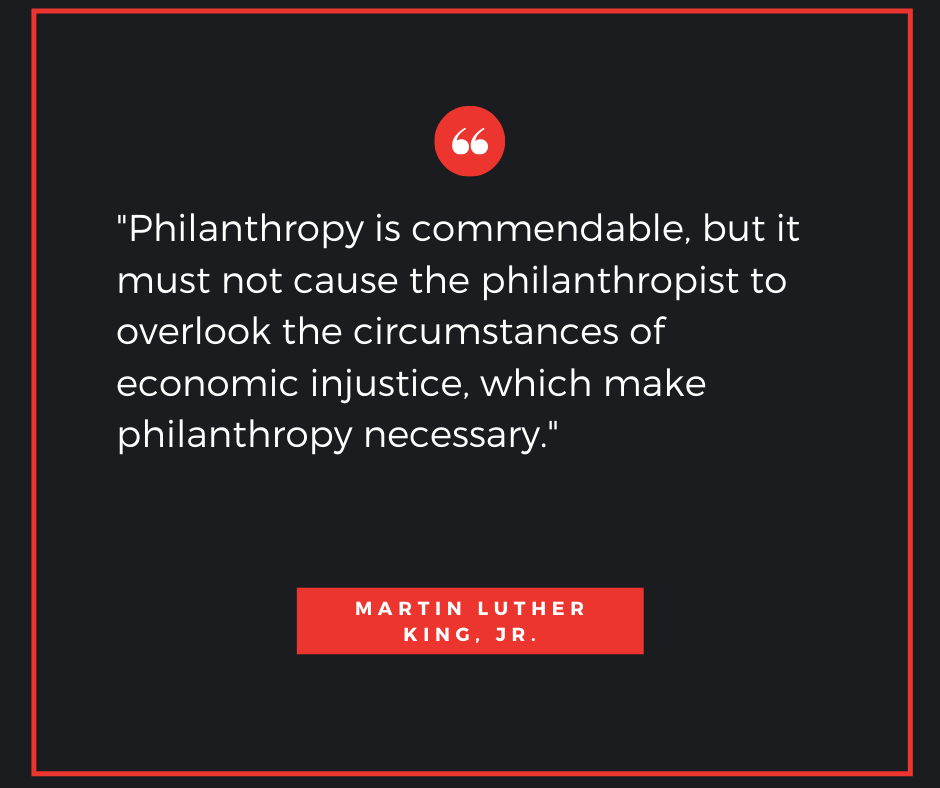The Gap Between Charity and Justice
“We the People of the United States, in Order to … establish Justice…”
From the Preamble of the Constitution of the United States of America
“Invoking the guidance of Almighty God… to secure just and rightful government…”
From the Preamble of the Constitution of the State of Oklahoma
In an adult church school class recently, we had a powerful exchange. I had completed explicating my proposals on what people of faith already know (or, in our traditions, we have known) that could foster a stronger social fabric. One of the proposals is: we know to address and how to address the question, “How much is enough?”
That proposal seems like such a beach ball pitch to me, a sure swing and a hit. Not that we throw that pitch often enough. But, other than the heretical prosperity gospel, I don’t know any religious tradition which claims that accumulating wealth is on the path to salvation. Rather, simplicity, seeking to be as unattached to possessions as possible—these practices are on the path.
Well, after I completed my presentation, two class members offered the following points of view (paraphrased):
POV #1: “But determining how much is enough is tricky, isn’t it? An individual may determine one level, but the government might judge by a different standard. That is when the principle gets sticky.”
POV #2: “Asking how much is enough, or how to divide between ‘enough’ and ‘too much,’ is a question that people with an abundance of means and stuff need to ask. But another question is, ‘How little is too little?’”
The first point of view implies the distinction between charity and justice. The second point of view implies a question of justice.
Being charitable, even generously charitable, is no substitute for enacting just policies and budgets in the pursuit of a relatively healthy society.
I still encounter people who believe that Christianity and justice have nothing to do with each other, except for the possibility that morality requires negative consequences for bad behavior. In this way of thinking, social justice belongs more with socialism than with Christianity. Charity is all a relatively free society, with a properly constrained government, can use to rectify economic inequalities.
 When the prophets of the Hebrew Bible spoke of justice, they were not tapping into socialism more than 2,500 years before the term was invented. Their plumb line for justice, based on their understanding of God, was how those with means and power treat those who are vulnerable. Alms for the poor? Sure. But charity is no substitute for justice rolling down the streets and halls of power like a mighty river.
When the prophets of the Hebrew Bible spoke of justice, they were not tapping into socialism more than 2,500 years before the term was invented. Their plumb line for justice, based on their understanding of God, was how those with means and power treat those who are vulnerable. Alms for the poor? Sure. But charity is no substitute for justice rolling down the streets and halls of power like a mighty river.
In Oklahoma, we rely a great deal on charity to rectify inequalities. Charitable foundations are powerful and generous. They undergird amazing programs, including a premier model of early childhood education, and have built wonderful public spaces.
But charity is a not a substitute for justice. The heart of justice is charity for, as some theologians put it, justice is the social expression of love. A society or community would not seek justice without a well-developed charitable disposition. However, voluntary charity cannot be scaled up sufficiently to meet a standard of justice.
Charity cannot repair school funding in Oklahoma. Religious organizations cannot substitute for state mental health programs, nor can they find a worthy home for every child or fill every hungry belly. Charity cannot provide adequate healthcare for those without insurance or with burdensome coverage gaps. Charity cannot maintain structurally sound roads and bridges, nor a truly livable-wage job market.
Charity, as voluntary action, is incapable of repairing the social damage correlated with gross economic inequality. Yes, charity has a role in repair, but as a supplement to justice rather than the other way around.
I did just a little searching and could not find an answer to this question. Perhaps you know the figure: what is the dollar gap between charity and justice? I get it, that this is not a simple math question. Adding up the total charitable dollars in the nation is easy enough. The figure for 2019 for the U.S. was $428 billion.
But what is the gap between that $428 billion and what economic justice for disadvantaged and vulnerable persons would require? The answer is a judgment call regarding what is just. That said, the gap is wider than that $428 billion would suggest, because that figure includes everything given to charitable organizations; in churches, a great deal goes to staff salaries and property. If charitable organizations gave away every dollar they received, there would still be a gap between justice and charity.
Remember the question: “How little is too little?” That is an acutely critical question today when the COVID economy is devastating state budgets.
That is not a question we hear often enough in society, despite the fact that “justice” is a function of government. But that question, or versions thereof, ought to be asked frequently in faith communities that preach and teach moral standards for determining what is just. Then, maybe, justice will flow through our halls and streets with greater power.
Dr. Gary Peluso-Verdend is president emeritus at Phillips Theological Seminary and is the executive director of the seminary’s Center for Religion in Public Life. The opinions expressed in this blog are those of the author. Learn more about the Center’s work here and about Gary here.


Comments are closed.